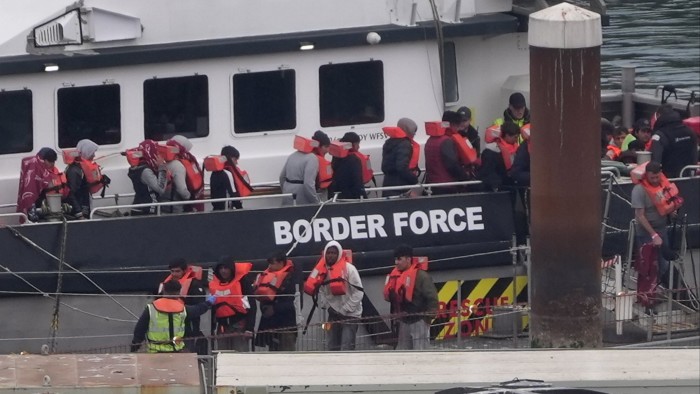Unlock the Editor’s Digest for free
Roula Khalaf, Editor of the FT, selects her favourite stories in this weekly newsletter.
British ministers are claiming the European Commission will support the migrant returns agreement between France and the UK, even as it faces severe pushback from several European countries and politicians on the French right.
Home secretary Yvette Cooper said on Friday morning that the UK and France had been developing the pilot scheme since last October and “EU commissioners have been very supportive”.
“We have designed this in a way to work, not just for the UK and France, but in order to fit with all their concerns as well,” she told LBC, adding that “we do expect the EU Commission to continue to be supportive”.
UK Prime Minister Sir Keir Starmer and French President Emmanuel Macron announced on Thursday they would launch a “one in, one out” pilot scheme in the coming weeks, under which some migrants who arrive in the UK via small boats would be detained and sent back to France. The UK will then accept the same number of migrants from France who have a legitimate claim, notably for family reunification.
Cooper declined to comment on how many migrants would be part of the initial scheme, or how large ministers hoped it would become once the pilot ends.
Though the agreement marks an important turning point in British and French diplomacy, huge hurdles to implementation remain, including tensions over where migrants that are rejected by the UK will end up.
The agreement poses difficult questions for the EU, and will shine a light on its dysfunctional internal systems for handling migrants that have long deeply divided southern and northern member states.

A Home Office official said the deal would not need “formal approval” from the commission, but the UK and France would “ensure they’re comfortable with the legal underpinnings”.
“We’ve been working pretty closely with them throughout, so we’re not too worried,” they said.
Starmer’s spokesperson said these arrangements had been discussed with the commission and “they did not expect any issues”.
“We’ve done a lot of work to make sure these measures are robust to legal challenges,” he added.
“The intention is for them to be dispersed away from northern France,” he said when asked what happened after irregular migrants were returned from the UK under the scheme.
He added that what happened to returned migrants was ultimately up to France.
Macron is taking a political risk by setting the post-Brexit precedent of taking back migrants from the UK, and is likely to face push back from opposition politicians, particularly from the far right.
Previous French presidents have refused requests by the British government to accept returns of asylum seekers, arguing they are people trying to reach the UK and are not France’s responsibility.
Xavier Bertrand, head of the Hauts-de-France region in the north of France bordering the channel, told BFMTV on Friday that the deal was “a bad deal for France” and a “good deal for the English”. “The English need to stop treating us like subcontractors,” he said.
“If there is no Europe this cannot work,” he said, noting concerns that France would have to keep even more asylum seekers as part of the accord because there would be nowhere else to send them.
“It’s up to the countries where they entered, Italy especially, to take up their share of the burden . . . This is primarily an issue for the EU,” he said.
The rightwing mayor of Calais, Natacha Bouchart, said she was “angry” about the new arrangement that she said would “add to the ranks” of illegal migrants that “bring disorder” to the city.

However, the so-called Mediterranean Five — Cyprus, Greece, Italy, Malta and Spain — have spoken out against the UK-France deal. The five states account for the bulk of migrant arrivals into the EU, and fear that France will seek to repatriate migrants deported from the UK back to them, citing the so-called Dublin rules on migrants remaining in the first EU country they enter.
But implementation of this mechanism has been patchy, following resistance from southern countries who argue that they are already overburdened by new arrivals and need more support from northern states. For example, France last year only transferred roughly 8 per cent of those it had sought to return to their country of entry under the Dublin rules, according to Eurostat.
The deal comes at an awkward time for the EU as it implements its new Migration and Asylum Pact, amid calls from some capitals for rules to be further tightened to restrict migrant arrivals.
A commission spokesperson said on Thursday that Brussels is “working with France and the UK as well as other EU member states to support solutions that are compatible with the spirit and the letter of EU law”, adding: “Our joint focus continues to be on the implementation of the pact on migration and asylum.”



